>
Shirley Collins >
Records >
No Roses
>
Ashley Hutchings & Albion Band >
Records >
No Roses
Shirley Collins and The Albion Country Band: No Roses
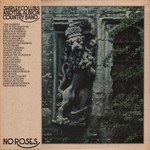 |
No Roses B&C CAS 1047 (LP, UK, not issued) |
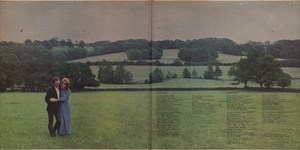 |
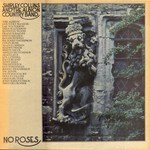 |
Philips 6303 046 (LP, UK, 1972) |
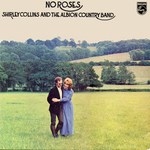 |
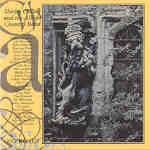 |
Mooncrest CREST CD 011 (CD, UK, 1991) |
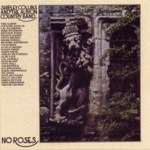 |
A September Production
Produced by Ashley Hutchings and Sandy Roberton
Musicians
Shirley Collins: vocals;
Ashley Hutchings: electric bass [1-7,9],
percussion [7];
Richard Thompson: electric guitar [1,5,6,7,9],
lead electric guitar [4],
slide electric guitar [8],
acoustic 12 string guitar [3];
Simon Nicol: electric guitar [1,2,4,9],
acoustic guitar [3,5,6],
vocal chorus [8];
Dave Mattacks: drums [4,9],
sticks [2];
Ian Whiteman: piano [1,5];
Roger Powell: drums [1,2,5-8];
Tim Renwick: electric guitar [4],
acoustic 12 string guitar [7];
Lol Coxhill: alto saxophone [1];
Maddy Prior: vocal harmony [6];
Dave Bland: concertina [1,5,6,9],
hammered dulcimer [2,8];
Tony Hall: melodeon [2,8];
John Kirkpatrick: accordion [3];
Dolly Collins: piano [3,9];
Nic Jones: vocals and last fiddle solo [4];
Barry Dransfield: fiddle [4],
vocal chorus [8];
Francis Baines: hurdy-gurdy [4];
Alan Cave: bassoon [1];
Alan Lumsden: ophicleide [5];
Steve Migden: French horn [7];
Colin Ross: Northumbrian small pipes [5];
Royston Wood: vocal [7],
vocal chorus [8];
Lal and Mike Waterson: vocals [7];
Gregg Butler: serpent [8];
Trevor Cozier: jew’s harp [8]
Tracks
Side 1
- Claudy Banks (Roud 266; Laws N40; G/D 5:1036; Henry H5, H693) (4.37)
- The Little Gypsy Girl (Roud 229; Laws O4) (2.16)
- Banks of the Bann (Roud 889; Laws O2; Henry H86) (3.38)
- Murder of Maria Marten (Roud 215) (7.28)
Side 2
- Van Diemen’s Land (Roud 519; Laws L18; G/D 2:252) (4.59)
- Just As the Tide Was A-Flowing (Roud 1105) (2.13)
- The White Hare (Roud 1110; TYG 79) (2.43)
- Hal-an-Tow (Roud 1520) (2.54)
- Poor Murdered Woman (Roud 1064) (4.17)
All tracks trad. arr. Shirley Collins, published by Roberton Brown
except track 1 Bob & Ron Copper, published by Copper Songs
Notes by Tony Rees
“The Albion Country Band” is credited as “Lal Waterson, Mike Waterson, Royston Wood, Francis Baines, Steve Migden, Roger Powell, Richard Thompson, Colin Ross, Alan Lumsden, Maddy Prior, Simon Nicol, Ashley Hutchings, Alan Cave, Lol Coxhill, Dave Bland, Tony Hall, Tim Rewick, Ian Whiteman, Barry Dransfied, Nic Jones, Dave Mattacks, Dolly Collins, Gregg Butler, John Kirkpatrick, and Trevor Crozier".
Most of the tracks of course only have a subset of the above playing, typically Shirley Collins with 6-8 backing musicians. The principal contributors are Ashley Hutchings (on eight of the nine tracks), Richard Thompson and Simon Nicol (seven tracks each), Roger Powell (drums on six tracks), and Dave Bland (concertina or hammered dulcimer on six tracks). Lal & Mike Waterson sing on The White Hare.
Ashley Hutchings had recently left Steeleye Span and teamed up with (and married) Shirley Collins in around 1970/71. In many ways No Roses follows the trail blazed by Fairport Convention’s Liege & Lief after Steeleye Span had started to go off in a more rock-folk (as opposed to folk-rock) direction with the departure of Martin Carthy and Hutchings. Of course, Ashley Hutchings, Simon Nicol and Dave Mattacks (all Fairport Liege & Lief alumni) also contribute to No Roses. Having said that, the musical palette is much wider and includes contributions by numerous other instrumentalists such as Nic Jones (guitar) and Barry Dransfield (fiddle), Tony Hall (melodeon), Colin Ross (Northumbrian small pipes), Frances Baines (hurdy-gurdy), Dave Bland (concertina and hammered dulcimer), and even Lol Coxhill on alto saxophone.
After the release of No Roses in 1971, there was little question of the band which made it going on tour, although a very few dates were played by a subset of the lineup (Shirley Collins, Ashley Hutchings, Richard Thompson, John Kirkpatrick and Royston Wood) as a last-minute substitute for a short tour by Shirley & Dolly Collins which had been previously booked.
The name “Albion Country Band” was subsequently adopted by Hutchings for his next “electric” venture in 1972, which included Royston Wood on vocals, Steve Ashley on vocals, harmonica and whistle, Sue Draheim on fiddle, Ashley Hutchings on bass, and Dave Mattacks on drums. This lineup was short-lived and eventually transmuted into the lineup which rehearsed for six months, played a few festivals, recorded Battle of the Field in 1973, then broke up again almost immediately. In the meantime, Collins recorded some vocals for another of Hutchings’ projects, Morris On, in 1972, and resurfaced with Hutchings (this time playing an acoustic bass guitar) in the Etchingham Steam Band in 1974 - along with mouth organist Terry Potter and accordionist Ian Holder. “Etchingham” was after the village in Sussex where Collins and Hutchings were living, and “steam” because they wanted a band which could be independent of electricity (as there were quite a lot of power cuts due to the miners’ strike in England around the winter of 1973-74!) - and also, according to Shirley Collins, quite descriptive, because of the huffing and puffing and pumping required to power the mouth organ and accordion! (Later in its brief existence, Terry Potter left the band and was replaced by Vic Gammon, and it is this lineup which appears on the 1975 Folk-Festival auf der Lenzburg compilation).
Sleeve Notes
When this album was first released in 1971, it was regarded as adventurous, combining a traditional English singer with 25 musicians, some from a folk background, other from the fields of contemporary rock and early music. It was an experiment which grew into a triumph, and sprang from the talents of Shirley Collins and Ashley Hutchings, both pioneers of their own right, in the first year of their marriage. Shirley, widely regarded as the doyenne of English traditional folk singers, had recorded her first album in 1959 for the highly respected American Folkways label, and subsequent albums were regarded as milestones, notably Folk Roots, New Routes made in 1964 with guitarist Davy Graham and Anthems in Eden, made with her sister Dolly in 1969 - the first album to unite traditional songs with early instruments, under the musical direction of David Monrow. Ashley Hutchings, a founder member of Fairport Convention, had left that pioneering band at the end of 1969, after recording Fairport’s seminal Liege & Lief, and, still hooked on traditional music, had then launched Steeleye Span.
No Roses was the album they made together, and Shirley still remembers it with pleasure: “It was my first venture into folk/rock and I suppose initially I didn’t think my voice was right for it. Whatever accompaniments I’ve used, I’ve always sung in my own style, my natural singing voice, which is an extension of my speech. So it was the arrangements that overlaid the songs that gave the record it folk/rock feel. I’ve always been willing to experiment providing I believe I can keep the integrity of the music intact. That’s paramount. I have a great love of English traditional music, and along with it a great respect for those people of the labouring classes who kept the songs going through the centuries as their only means of expressing themselves. It is an extraordinary feat, especially as many of them were illiterate. They’ve never been given enough credit or respect for their art. Instead, they’ve been scorned, despised and largely ignored. It’s one reason why I’ve always named my sources. I trust that No Roses had that integrity, as well as strength and beauty in some of the arrangements and a great sense of fun and charm in others.”
Looking at No Roses with the benefit of hindsight, one presumes that Ashley and Sandy (Roberton, co-producer with Hutchings) were determined to make an epic album. “No, we didn’t set out with that intention, but as the album progressed, the possibilities of what we could do became more and more apparent. At the start we didn’t anticipate having 26 musicians on it, but that’s how it finally turned out. There was never any conflict between the Fairport people and the other musicians. They were open-minded and interested in what others were doing anyway, and there was certainly a good feeling in the studio (Sound Techniques). The place was full of people who kept dropping in and staying on and asking to play on songs - just happy to be there. Nobody seemed baffled by what anyone else was doing, just a bit bemused perhaps by the variety of esoteric instruments that were coming in and out of the studio.”
“The critical reaction was pretty good - on the whole! One or two snipers, of course.” No Roses marked the debut of The Albion Country Band. The Albion Band continues to be the name used by bands led by Ashley Hutchings, although it was a name coined for use on this album. “We realised that with all those musicians it would probably be a good idea to give them a collective name and that was the one we came up with.”
So why was there never a second album? “I had two children from my first marriage, and we’d all moved to Etchingham in the Sussex countryside. I’d been touring all my singing life, away from home too much, and I wanted to be with Polly and Robert more, so I let my own career slip a bit, for the best of reasons. Ashley had formed a touring bend with the first of many line-ups and used the Albion name, and all our efforts went into trying to keep that going. When Ashley and I eventually parted, he took the Albion Band with him. No Roses stayed with me.”
Acknowledgements
Thanks to Tony Rees for his notes.

